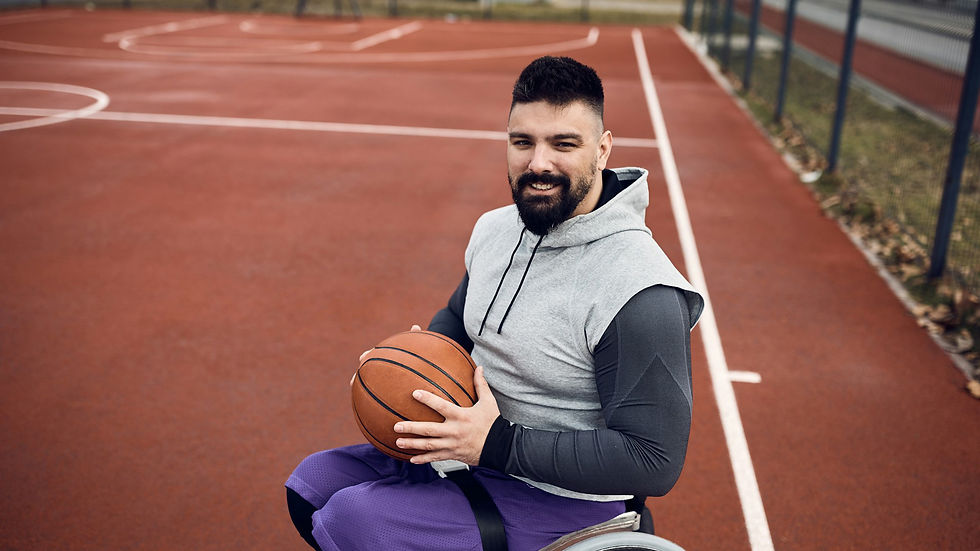Title VI Compliance in College Sports: From Policies to Practice
- Scarlett Vera
- Sep 11, 2024
- 7 min read
Updated: Sep 19, 2024

Introduction: The Landscape of College Athletics and Civil Rights
Success in sports requires more than just talent—it demands an environment where athletes feel safe, supported, and respected, regardless of their background. Title VI of the Civil Rights Act of 1964 plays a crucial role in shaping this environment by prohibiting discrimination based on race, color, or national origin in federally funded programs. Additionally, Title IX extends these protections by prohibiting sex-based discrimination in all education programs and activities that receive federal financial assistance, highlighting its broader implications beyond athletics. As a former Division I athlete and current compliance consultant, I’ve experienced the complexities of college athletics firsthand. Recently, the Office for Civil Rights (OCR) has stepped up enforcement of these protections, particularly within athletics programs. Let’s explore how Title VI is influencing college sports today, using recent OCR agreements as our guide.
Title VI: The Foundation of Equality in Collegiate Sports
Title VI mandates that colleges and universities receiving federal funding must prevent discrimination and harassment based on race, national origin, or shared ancestry. The Education Amendments, particularly Title IX, play a crucial role in shaping policies to prohibit sex-based discrimination in educational programs. For athletics programs, this means ensuring fair treatment of all athletes and addressing discrimination complaints promptly and effectively. The OCR has been actively investigating universities where these standards have not been met, highlighting the ongoing need for comprehensive compliance efforts across all facets of college sports.

Recent Title VI Investigations in Universities and Their Impact
Recent investigations at institutions like the University of Michigan, Brown University, and the City University of New York (CUNY) have revealed systemic failures in addressing discrimination claims, often impacting athletics programs directly and indirectly. For example, at CUNY, OCR identified instances where alleged antisemitic and Islamophobic incidents were not adequately investigated, leading to a resolution agreement that now requires re-evaluating past complaints and implementing new training protocols.
Lessons from OCR Enforcement Actions
A critical takeaway from the OCR’s recent enforcement actions is that universities need to take a proactive stance in handling discrimination complaints, rather than waiting for incidents to escalate. At the University of Michigan, OCR found that the university had failed to comply with Title VI in its handling of 75 reports of shared ancestry discrimination during the 2023–24 academic year. The resulting agreement highlighted the importance of thorough investigations, clear communication, and consistent enforcement of anti-discrimination policies.
Non-compliance with these regulations can lead to significant repercussions, including the potential loss of federal funds.
The Shift in Title VI Application
From a compliance perspective, this signals a shift in how Title VI is being applied to college athletics. Athletics programs are often the public face of universities, and any missteps in handling discrimination can have far-reaching consequences for both the institution's reputation and its compliance status. The OCR's recent actions indicate that merely having policies in place is not enough. Universities must actively ensure that these policies are being implemented consistently across all departments, including athletics.

Compliance Requirements in College Sports
Title IX compliance is a cornerstone of equitable college sports programs, ensuring that all athletes, regardless of gender, have equal opportunities to participate and thrive. Institutions receiving federal financial assistance must adhere to specific requirements enforced by the Office for Civil Rights (OCR). A key component of this compliance is the designation of a Title IX coordinator, who oversees the institution’s efforts to meet these standards.
Compliance requirements include providing equal opportunities for male and female athletes, ensuring they have equal access to facilities, resources, and benefits. This means that both male and female athletes should have comparable quality in training facilities, equipment, coaching, and support services. Regular self-assessments are crucial for identifying any areas of non-compliance and developing actionable plans to address these issues.
Training is another critical aspect. Institutions must provide comprehensive training for athletic staff and students on Title IX policies and procedures, ensuring everyone understands their rights and responsibilities. The OCR conducts investigations and audits to ensure compliance, and institutions that fail to meet these standards may face significant penalties, including the loss of federal funding.

Ensuring Equal Opportunities for All Athletes
Creating an inclusive and equitable environment in college sports means ensuring that all athletes, regardless of gender or ability, have equal opportunities to participate and succeed. Title IX mandates that institutions provide equal opportunities for male and female athletes, which includes equal access to facilities, equipment, and coaching.
Institutions must also ensure that their programs are accessible and inclusive for athletes with disabilities. This involves making necessary accommodations and providing support to ensure that all athletes can fully participate in their sports.
Regular assessments of athletic programs are essential to ensure compliance with Title IX. These assessments should include a thorough review of participation rates, scholarship awards, and the composition of coaching staff. Institutions must also ensure that male and female athletes receive equal treatment and benefits, such as access to medical and training services, housing, dining services, and publicity.
By committing to these practices, institutions can foster an environment where all athletes feel valued and supported, paving the way for a more inclusive and equitable athletic program.
Addressing Discrimination and Harassment in Athletics
Addressing discrimination and harassment within athletics programs is vital to creating a safe and inclusive environment for all student-athletes. Institutions must have robust policies and procedures in place to address these issues effectively. This includes clear procedures for reporting and investigating incidents of discrimination and harassment.
Training is a key component in this effort. Institutions must provide regular training for athletic staff and students on discrimination and harassment policies and procedures. This training should cover how to recognize, report, and respond to incidents, ensuring that everyone in the athletics program understands their role in maintaining a respectful and inclusive environment.
The OCR plays a crucial role in ensuring compliance with these standards. Through investigations and audits, the OCR ensures that institutions are adhering to their policies and taking appropriate action to address discrimination and harassment. Institutions that fail to comply with these requirements may face penalties, including the loss of federal funding.
By proactively addressing discrimination and harassment, institutions can create a safer and more supportive environment for all athletes, fostering a culture of respect and inclusion.
Monitoring and Accountability in Title VI Implementation
Effective implementation of Title VI in college sports programs requires ongoing monitoring and accountability. Institutions must regularly review their athletic programs to ensure compliance with Title VI requirements, which include providing equal opportunities for male and female athletes, equal access to facilities and resources, and equal treatment and benefits.
Regular self-assessments are essential for identifying areas of non-compliance and developing plans to address these issues. These assessments should include detailed reviews of participation rates, scholarship awards, and the composition of coaching staff. Institutions must also provide regular reports to the OCR on their compliance efforts, including data on these key areas.
The OCR uses this data to monitor compliance and identify areas where institutions may need additional support. Through investigations and audits, the OCR ensures that institutions are meeting their obligations under Title VI. Institutions that fail to comply with these requirements may face significant penalties, including the loss of federal funding.
By committing to regular monitoring and accountability, institutions can create inclusive athletic environments that provide equal opportunities for all athletes, regardless of race, color, national origin, sex, or disability. This not only ensures compliance with federal regulations but also fosters a culture of inclusivity and respect within college sports programs.

Best Practices for Safe and Inclusive Athletic Environments
The OCR agreements highlight several action items that universities can adopt to create safer, more inclusive environments for athletes: Addressing issues such as racial discrimination and sexual orientation is crucial in ensuring that all athletes have equal opportunities and a supportive environment.
1. Revise Policies and Procedures:
One of the most common findings in recent investigations is that university policies were either outdated or inconsistently applied. Athletics departments should regularly review and update policies related to discrimination and harassment to ensure they align with Title VI requirements. Policies should clearly define discrimination and harassment, outline reporting procedures for athletes, and detail the steps for investigating and addressing complaints.
2. Implement Annual Non-Discrimination Training for Athletics Programs:
Training is essential for compliance. The OCR agreements require universities like Brown and Michigan to conduct annual nondiscrimination training for all employees and students, focusing on handling complaints of ancestry-based discrimination. For athletics programs, this training should address the unique challenges faced by athletes, coaches, and support staff, emphasizing the importance of a respectful and inclusive team environment.
3. Maintain Detailed Records:
Accurate recordkeeping is essential for compliance and ensures that all complaints are taken seriously and investigated thoroughly. Universities are now required to maintain detailed records of all discrimination complaints, including how each case was handled and resolved. Athletics departments must keep meticulous documentation of any reported incidents involving athletes, coaches, or staff, as well as the actions taken in response.
4. Conduct Campus Climate Surveys for Athletics:
Understanding the current climate within athletics programs is key to identifying areas for improvement. The OCR agreements encourage universities to conduct campus climate surveys to gauge the prevalence of discrimination and the effectiveness of existing policies. For athletics, these surveys can provide valuable insights into how athletes perceive their environment and whether they feel supported in reporting incidents of discrimination.

The Path Forward: Compliance and Athlete Protection
The work to create safe spaces within athletics programs is ongoing. The recent actions by OCR serve as a reminder that universities must not only comply with Title VI but also actively work to foster an environment where all athletes feel valued and protected. Title IX has significantly impacted women athletes and women's sports by ensuring equal opportunities and mandating compliance from educational institutions, which has led to increased participation and funding for female athletes.
Cultivating a Culture of Respect and Inclusion
For athletics departments, this means taking a leadership role in promoting inclusivity, from the highest levels of administration down to individual teams. Compliance with Title VI should be seen not just as a legal obligation but as a commitment to the athletes who dedicate themselves to their sport and their school. By implementing best practices and learning from recent OCR enforcement actions, athletics programs can help ensure that all athletes have the opportunity to compete in a supportive, nondiscriminatory environment.
Creating a culture of respect and inclusion is the best defence against Title VI violations. It empowers athletes, builds stronger teams, and upholds the integrity of college sports. For any athletics program, this is a goal worth pursuing with dedication and purpose.

How Distinct Consulting Can Help
At Distinct Consulting, we pride ourselves on our ability to guide your institution beyond compliance and convert meeting those regulatory requirements into opportunities for growth and distinction. By investing in compliance, your institution invests in its future as a leader in education, athletics, and community engagement.
Let’s work together to boost your institution’s reputation and secure its future. Whether developing policies, conducting audits, or providing training, we’ll be with you every step of the way to ensure success and sustainability.




Comments